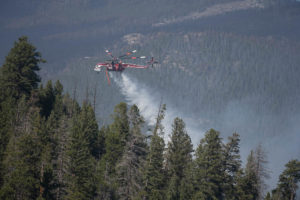FORT COLLINS, Colo. — A team of scientists at Colorado State University has received an award of nearly $50,000 from the National Science Foundation to study snowpack, streams and sediment in waterways in the areas affected by the largest wildfire in Colorado history.
Stephanie Kampf, principal investigator and a professor in the Department of Ecosystem Science and Sustainability, said the team came up with the study concept as they watched the Cameron Peak Fire begin to burn northwest of Fort Collins in August 2020.
The fire was at 92% containment as of Nov. 18.
“Given that the fire was burning in our local watershed, everyone is curious about what would happen with our waterways,” she said. “The Cameron Peak Fire has been unique, since it started at and burned a large area at high elevation.”
Kampf said the fire is the fifth largest in a high-elevation persistent snow zone in the Western United States since 1984.
“As researchers started looking for examples of other high-elevation fire studies, we realized that not much research has been conducted,” she said.
CSU Assistant Professor Sean Gallen and Professor Sara Rathburn, Department of Geosciences, and Assistant Professor Ryan Morrison, Department of Civil and Environmental Engineering, are co-investigators on this project. Kampf said that scientists from the United States Geological Survey will also collaborate on the research.










